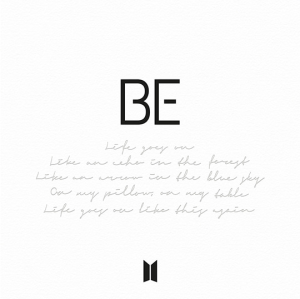To ‘Be’ or not to ‘Be’: BTS’s big question

Big Hit and Columbia [Fair Use]
BTS had a major hand in the production and direction of their latest album “Be,” which entails the group’s feelings about the ongoing pandemic.
December 3, 2020
After “Dynamite” smashed records and topped the charts earlier this year, BTS’ future sound seemed unclear: would they ‘be’ catering to an American audience for more recognition, or would they ‘be’ expanding on their old sound? The answer seems to be neither, as their latest album “Be” is a softer, more laid-back piece of work meant for comforting fans through the pandemic.
The album’s biggest strength is the message behind the pandemic pop. It certainly isn’t the music, which is mostly forgettable and lacks the punch of older BTS songs. The exceptions are “Telepathy” and “Dynamite,” though neither song is particularly great. This album is part of a larger trend where BTS’ success seems to draw from the group’s ideas and messages rather than the quality of their work. While the message of “Be”—that life goes on, even during a pandemic—is sweet, the songs either blur together or blare obnoxiously.
“Life Goes On” is one of the songs that blurs together. To be honest, I listened to it five times and I still can’t remember what it sounded like. It is, however, accompanied by a comforting member-focused music video. The chorus sounds like it was written for sing-along sessions at home, and the song’s crooning vocals are sure to make it a fan-favorite.
Next on the album, “Fly To My Room” sounds like a song from labelmate group TXT at times, especially with the heavily processed vocals in parts of the chorus. There’s nothing wrong with that, but I would hope that a seven-year-old group like BTS has better vocal technique than a rookie group. The chorus makes it more anthemic than “Life Goes On” but there’s not much that differentiates the two.
“Blue and Grey” is the most bearable song on the album. The jarring autotune that has come to characterize BTS’s sound was thankfully absent from this sentimental track. It’s rather minimalistic, and the instrumentals backing the vocals work heavily in its favor. The rapping and singing are soft and relaxing, and the song sounds like the perfect background track to lonely periods in one’s life.
The fourth track was “Skit,” an audio clip of the group talking about how “Dynamite” achieved #1 on Billboard’s Hot 100, the first song of theirs to do so.
“Telepathy” is next, an upbeat EDM song with an unflinchingly catchy beat. It feels quirky and optimistic, though those are the only things that really keep the song moving forward. It was sandwiched into a difficult spot on the album, as it barely kept the musical momentum alive after the preceding skit spoken in Korean.
I liked “Dis-ease” the most on the album. The beat and the rap verses that constantly change styles add a touch of hip-hop to the song. I particularly enjoyed rapper J-Hope’s (Jung Hoseok) opening verse and ad-libs, and his voice made the song’s transitions from verse to verse cohesive.
“Stay” starts out as a sentimental song, then transforms into a pop party anthem after the beat drops. A consequence of this unpredictability is a buildup that feels out of place, though the rest of the song flows well after the chorus.
I absolutely abhorred “Dynamite,” the last song on the album, when it first came out in August, but my opinion has considerably improved after listening to the rest of the album. At the very least, the blaring song was memorable and contributed to the rise of a retro trend in the K-pop genre. Even corny lyrics like “cup of milk let’s rock and roll” are infinitely more memorable than the entirety of “Life Goes On.”
The most positive thing I can say about this album is that it made me like flamboyant title tracks I had previously frowned upon like “Dynamite,” “ON” and “Black Swan” because I was so thoroughly disappointed by the release. This raises the question, though: does BTS want to be musicians, or does the group want to be performers?
Until they figure out the answer, I’ll continue cleaning my ears with their earlier albums, as this one was a hard pass.








